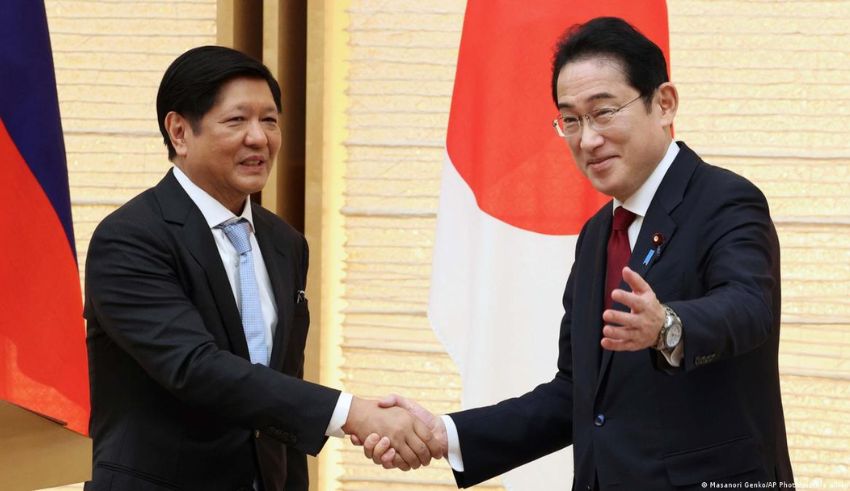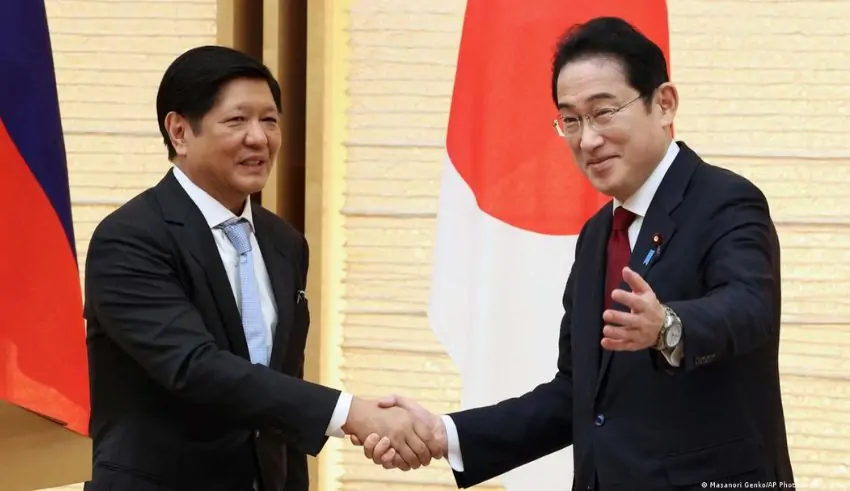

(C) DW
As Prime Minister Fumio Kishida embarks on an extraordinary diplomatic mission to the Philippines, his journey transcends mere state visits. It’s a carefully orchestrated symphony of international relations, composed with the region’s security as the backdrop and the rising notes of regional tensions.
In the heart of this diplomatic crescendo, Japan unveils a crucial commitment — the provision of defense equipment to the Philippines, shrouded in a new aid framework. This commitment isn’t just about hardware; it’s a note in the harmony of regional security, an emblem of solidarity against the backdrop of escalating territorial disputes.
Underpinning Kishida’s visit is a concerted effort to compose the score of mutual access. The Philippines and Japan are poised to craft a treaty, a lyrical dance that enables both nations’ troops to harmoniously traverse each other’s borders. This symphony will make possible collaborative security arrangements and joint endeavors, enhancing their collective defense.
But Kishida’s journey is not just about agreements and alliances; it’s an overture that resonates across history. His forthcoming address before the Philippine Congress isn’t just a speech; it’s a thematic statement, a clarion call for Japan’s renewed engagement in Southeast Asia. It’s an operatic crescendo, emphasizing Japan’s commitment to peace and stability in the region.
Amid this symphonic diplomacy, a recurring melody emerges — the commitment to maintaining a “free and open international order based on the rule of law.” It’s the leitmotif that underscores Japan’s unwavering dedication to regional harmony, a theme that’s woven into the very fabric of their diplomatic composition.
Kishida’s pivot isn’t just geopolitical; it’s rooted in a deep sense of history and an awareness of the world’s evolving harmony. Russia’s actions in Ukraine echo an unsettling tune, stirring Kishida’s conviction that the echoes of conflict could reverberate across Asia. In response, Japan is orchestrating a complex crescendo, a defense buildup of historic proportions, and a concerted effort to form alliances that echo across the Indo-Pacific.
The notes that precede Kishida’s arrival set the stage — Mitsubishi Electric’s delivery of radar units. It’s a strategic note, marking the first transfer of Japanese defense equipment since export restrictions were relaxed. Symbolically, this note echoes Japan’s commitment to empowering its regional partners, crafting a symphony of collective security.
The recent maritime discord between the Philippines and China adds an urgent note, emphasizing the region’s security dynamics. This isn’t just a note of tension; it’s a profound call for harmonious regional engagement.
Kishida’s journey doesn’t end in the Philippines. The final movement takes him to Malaysia, where he continues to orchestrate alliances. This symphony of diplomacy resonates with new opportunities for cooperation and collective security arrangements, where Japan plays the conductor, leading an ensemble of like-minded nations.
In this grand symphony of diplomacy, Kishida’s notes aim to strike a chord of peace, security, and collaboration, underscoring Japan’s commitment to regional stability.
China is stepping up its game in Indonesia’s electric vehicle (EV) battery industry after a major exit by South Korea’s…
The jersey worn by Kobe Bryant during his NBA debut has sold for an impressive $7 million at auction which…
Before the national election that will take place on May 3, the government of Singapore ordered Meta, Facebook’s parent company…
The Vivo V50 Lite 5G enters the Malaysian market as it brings an impressive battery capacity along with an unexpected…
In an auspicious start to 2025, Hyundai Motor posted a 2% gain in its operating profit for the first quarter,…
China has made its latest stride into space. On April 24, 2025, launched from the country's northwestern Jiuquan Satellite Launch…
This website uses cookies.
Read More